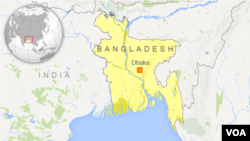Security forces in Bangladesh have arrested 12 suspected militants, including two top leaders of an al-Qaida affiliate that started in South Asia last year.
The militant group had claimed responsibility for killing two bloggers who campaigned against conservative Islam in Bangladesh.
Officials of Dhaka’s anti-terrorism unit, the Rapid Action Battalion, announced the arrests Thursday following a series of raids that started the previous day and continued until midnight.
RAB spokesman Major Maksudul Alam said some of the suspects were taken into custody at a rail station, while others were apprehended at their hideouts in Dhaka.
Those arrested included Mainul Islam, chief coordinator of al-Qaida in the Indian Subcontinent, and Zafar Amin, an adviser to the group.
Al-Qaida had announced the formation of this group last September, saying it would wage jihad in South Asia and rescue Muslims from injustice and oppression in Myanmar, Bangladesh and India.
Alam, the RAB spokesman, said intelligence reports indicated they were planning a terror strike in Bangladesh. He said the arrests would lead to recovery of huge amounts of explosives being used to make bombs, plus extremist literature being used for training.
Alam said the 12 arrested militants were headed for a madrasa in Bogra district that had been selected to recruit and train members.
"They are trying to collect their members and they are trying to collect some of the equipment to announce that this organization is still running in this area and they are operational," he said.
In May, in a nine-minute video, al-Qaida in the Indian Subcontinent claimed responsibility for the killing of several writers and intellectuals in Bangladesh and Pakistan, calling them blasphemers.
The victims included Bangladeshi-born U.S. citizen Avijit Roy. The prominent blogger and staunch critic of religious fundamentalism was hacked to death on a Dhaka street in February. The group also said it had killed Rajib Haider, another Bangladeshi blogger.
Intelligence agencies in India, Bangladesh and Myanmar had gone on alert following the formation of the local affiliate of al-Qaida. At the same time, security analysts expressed confidence that it would not be easy to find recruits in these countries, which have large Muslim populations but where there has been little appetite for joining groups like al-Qaida and the Islamic State.




